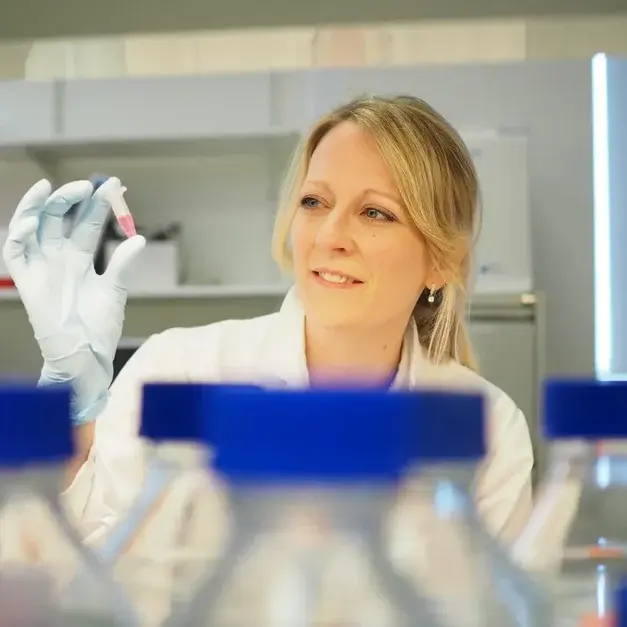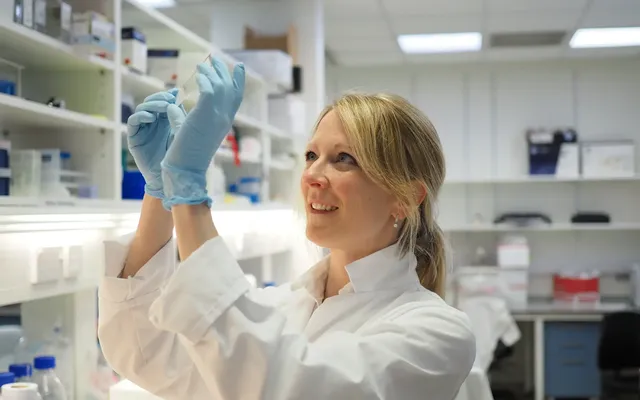Treating nerve injury after whiplash
Professor Annina Schmid, from the University of Oxford, is investigating pain after a whiplash injury.
Professor Annina Schmid, Specialist Physiotherapist and Professor of Pain Neurosciences at the University of Oxford, is a leading expert in whiplash.
Thanks to your donations, Annina has been investigating how and why persistent pain develops after a whiplash injury, and whether this is caused by injury to nerves.
Her work has helped to uncover why so many whiplash patients experience chronic pain, while others do not.
Examining levels of pain after whiplash
“Around 50-70% of people are able to recover from whiplash, sometimes spontaneously,” Annina explains. “Whiplash in fact covers a spectrum of injuries. The most common is whiplash associated disorder type 2, where people experience musculoskeletal issues like neck pain and stiffness in the absence of nerve injuries on routine clinical assessments. Many of these patients develop chronic pain but we don’t fully understand why, as diagnostic tests don’t tend to show anything abnormal.”
While certain factors, like higher initial pain intensity and post-traumatic stress, could contribute to poorer rates of recovery from an injury like whiplash, it has been difficult to pinpoint which patients will ultimately experience persistent pain symptoms.
Annina and her team set out to answer just this. “We invited people with acute whiplash injury to see us one month after their injury,” she explains.
The team performed tests on nerve function and structure, including detailed neurological examinations, sensory testing, and skin biopsies to examine nerve fibre integrity. They also used a blood marker to assess the level of nerve damage. “We repeated these measures again at the six-month mark and asked patients if their symptoms still persisted.”
This finding shows there may be a distinct subgroup with specific treatment needs, as nerve-related pain is treated differently to other types of pain.Professor Annina Schmid
Identifying nerve injuries
Annina wanted to determine whether there are any indications that patients with whiplash injury have signs of nerve fibre damage within one month after injury. The team also sought to understand how this damage evolves over time. “We successfully identified a subgroup of patients with signs and symptoms of nerve injury, which so far has gone unnoticed in routine clinical examinations,” Annina says. “This finding shows there may be a distinct subgroup with specific treatment needs, as nerve-related pain is treated differently to other types of pain.”
“Our robust measures have demonstrated the presence and development of nerve injuries in these patients,” says Annina. The team’s findings highlight the need for more in-depth and detailed clinical assessments, to ensure patients with potential nerve injuries like these are not overlooked.
Joel Fundaun, a postdoctoral researcher from Annina’s group, adds, “Current treatments for people with whiplash injury do not include any nerve-related options. While our study didn’t test treatments, it lays the groundwork for future research to explore targeted nerve-directed treatment options for this subgroup.”
Annina also believes the study will validate patients facing stigma associated with whiplash injury. “Often, we can’t find evidence of injury to nerves after whiplash. This can make patients feel invalidated or question their pain. Now that we have found evidence of nerve involvement in some patients, it may help reduce that stigma.”

Supporting Allied Health Professionals
Being a physiotherapist herself, one of Annina’s ambitions was to highlight the contributions of Allied Health Professionals to pain research. “It’s very difficult for Allied Health Professionals to enter clinical academic pathways,” says Annina. “With the Foundation’s help, we were able to support Joel, also a physiotherapist, in this project, and he earned his PhD at the University of Oxford as a result. I’m immensely proud that this project not only led to exciting clinical results, but also helped to build capacity that will hopefully have a lasting impact.”
Can we help reduce or prevent chronic pain by providing more personalised and targeted treatment?Professor Annina Schmid
Working towards better treatments
Now, Annina wants to explore new treatment options for nerve-related pain in whiplash patients. “Can we help reduce or prevent chronic pain by providing more personalised and targeted treatment? This is the direction in which we hope to progress; from discovery research to making a tangible change to treatment.”
Since winning our Emerging Leaders Prize in 2020, Annina has gone on to receive a highly prestigious fellowship from the Wellcome Trust. She has also secured larger grants, including one from the Advanced Pain Discovery Platform, expanded her research group, and was awarded a professorship at the University of Oxford.
Her team would like to extend a huge thank you to donors of the Foundation, whose support has helped them achieve these goals.
Pain research is desperately needed. The Foundation’s funding has enabled us to deliver exciting and potentially ground-breaking results in the field of whiplash, taking us closer to developing targeted and effective interventions for people living with pain. Professor Annina Schmid

Related: Transforming pain management in babies
Research on pain by Professor Lorenzo Fabrizi, another of our researchers featured in the Impact Report, is uncovering how babies experience pain.
Lorenzo's research
More impact stories
Take a look at our impact pages for a range of stories about the difference we have made through our funded research.
Our impact
Our full impact report
Thanks to you, we’re supporting some of the brightest and best medical researchers in the world to solve neglected health problems.
In our impact report, we showcase some of the life-changing science you’ve made happen.
2025 Impact ReportDonate now and change lives
Your support has led to ground-breaking discoveries and life-changing advances, but there is still more to do. For every researcher we support, there are many more we can’t – not because they lack merit, but because we lack the funds to support them all. You can change that. Your donation today could support research like Annina's, and could fund the next life-changing discovery.
Donate now